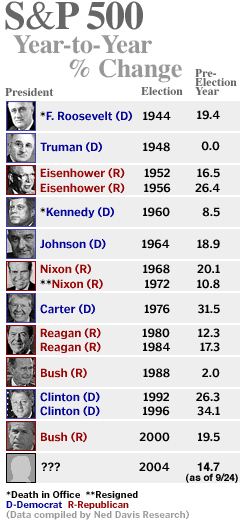NEW YORK (CNN/Money) -
If stocks end the year higher than they started, it could be because the Tampa Bay Buccaneers won the Super Bowl. Or it could be because the country will get a new president in 2004.

The S&P 500 has gained in every pre-election year since 1939, except for one, when it was flat. With gains of nearly 15 percent so far in 2003, the index is almost certain to end the year higher. But unlike the legends of January, the Super Bowl and the length of hemlines, the pre-election year indicator is not without reason, economists say.
"There are some very important timing issues that come into play," said Brian Wesbury, chief economist at Griffin, Kubik, Stephans & Thompson. "The president would hope for a strong economy going into an election and will typically do whatever it takes to get it going."
In this pre-election year, as in others, fiscal and monetary policy stimuli are running high. So far this year has seen a $350 billion tax cut package passed in May and the Federal Reserve's commitment to keeping interest rates, currently at a 45-year bottom, low.
"The combination of fiscal and monetary stimulus right now is the largest I've seen in years," said Greg Valliere, political economist and chief strategist at Charles Schwab Washington Research Group. "It's good for GDP. If the economy starts to hum, stocks should do well."
The effects of President Bush's tax cut are already being seen. More companies, most notably Microsoft (MSFT: Research, Estimates), are beginning to offer dividends to their investors, due to a tax cut on the payouts. Some Americans are also seeing more money in their pockets from the tax cuts, and this is stimulating consumer spending and helping the economy.
Government spending is running high as well. It is up about 7 percent year-over-year after an 8 percent increase last year. Though much of the spending increase is a direct result of the war in Iraq and other costs related to activities in the Middle East and the fight against terrorism, money has flown into other areas too, such as education. The federal government increased education spending by $13.2 billion, or 28.5 percent, in 2003 over 2002, according to the White House Office of Management and Budget.
But though the hype leading up to elections may boost stocks, Wall Streeters warn that unfulfilled campaign promises and curbs on government spending have meant a much more spotty performance for the market in post-election years. In fact, stocks have risen only half of the time in the years following elections since 1941.
"I think sometimes after we have this type of party, there is a hangover -- and this comes in '05," said Valliere. "The new Congress in '05 will make efforts to restrain growth. They may not rescind the tax cuts, but there will be spending restraint. But between now and then, it's just a party."

|

